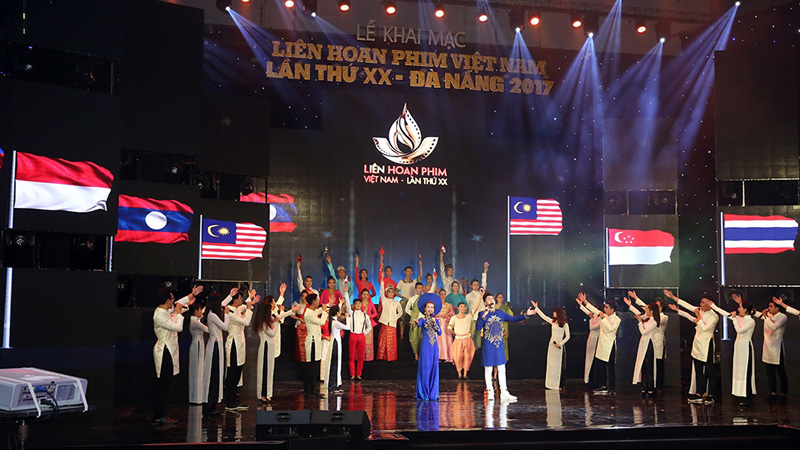


|
A view of the opening ceremony of the Vietnam Film Festival 2017 in Da Nang city on November 25 (Photo: VGP) Under the theme "Building a Modern and Humane Cinema
Industry”, this year’s festival introduced 16 feature films, 26
documentaries, 17 scientific films and 18 animated films, which were produced
and released over the past two years. The video films category is eliminated
in this year’s event.
The best entry will be awarded with the Golden Lotus,
followed by the Silver Lotus and the Special Jury Prize. The best director,
scriptwriter, cameraman, and leading actors and actresses will also be
honoured on the occasion.
The launching of ASEAN Film Award
The ASEAN Film Awards have been included for the first time
at the 2017 festival as an initiative from the Vietnam Cinema Department with
the support from the ASEAN Film Fund and ASEAN Secretariat.
Deputy Minister of Culture, Sports and Tourism, Vuong Duy
Bien stressed that the ASEAN Film Awards will highlight the identities and
cultures of 10 ASEAN countries. He said the festival will also mark the 50th
anniversary of ASEAN this year.
Ngo Phuong Lan, Head of The Vietnam Cinema Department under
the Ministry of Culture, Sports and Tourism, said that from 2017, ASEAN
member nations will take turn to host the event annually. The event is
designed to introduce the best movies in the region to the world and affirms
the role of the cinema industry in strengthening friendship among the ASEAN
community while providing a good opportunity to advertise Vietnamese
high-quality films and its culture to neighbour countries.
Accordingly, 10 ASEAN nations selected one of their best
cinematic works, which was released commercially between 2016 and 2017 in
their home country, to compete for the awards. The best film will be awarded with
US$ 3,000. There will be other sub awards honouring Best Director, Best Actor
and Best Actress.
The launching of the ASEAN Film Awards has been
enthusiastically applauded by ASEAN member countries as the awards marked the
first step towards fully establishing the regional film industry. Adapted from the drama of the same name by theatre director
and playwright Thanh Hoang, the film highlights the country’s traditional
culture and the nostalgia of The Overseas Vietnamese community.
However, by competing at for the ASEAN Film Awards, Da Co
Hoai Lang is not eligible to compete at other category of the Vietnam Film
Festival.
The acceptance for remake films
Another new feature of the 2017 Vietnam Film Festival is
that films remade from foreign works (based on foreign films’ scripts) are
accepted at the festival but won’t have a chance win the Best Film and Best
Scriptwriter Awards.
Two remakes at the festival included ‘Ban Gai Toi
La Sep’ (She's the Boss) by director Tran Ham, and ‘Sac Dep
Ngan Can’ (200 Pounds Beauty) by director James Ngo, both were based
on earlier scripts of the same name films from the Republic of Korea. The two
films have been appreciated by Vietnamese cinema goers when they hit the big
screen in 2017. As the remake of films has become a new trend in film
production in Vietnam, the acceptance of remake films shows a more
open-minded view from the organising board.
However, a few years ago, approximately 10 remake films
were produced each year, but the number has increased to 50 over the recent
years. The rising number of remade film has also pointed out the shortage for
good scripts and scriptwriters.
Although remade films are now accepted at a professional
event like the Vietnam Film Festival, film makers have said that the
acceptance and response from the audience will be the most important factor
when deciding whether the type of film will be temporary or further developed
in Vietnam in the future.
The absence of State-run film studios at feature films
category
The previous Vietnam Film Festival 2015 saw the dominance
of private films; however, there were still films produced by State-run and
military-run film studios, such as Thau Chin o Xiem (Ho Chi
Minh in Siam), Cuoc Doi Cua Yen (Yen’s Life), and Toi
Thay Hoa Vang Tren Co Xanh (Yellow Flowers on the Green Grass), all
of which won prizes at the festival.
But for the first time in its 47-year history, 100% films
competing in the feature films category of the 2017 Vietnam Film Festival
were produced by private film studios.
Although there was no film produced by State-own film
studios submitted this year, the organising board believed that through their
films submitted to the festival, private film studios would change the
opinion of the public, who has a set mind that their products are just films
for commercial and contain entertainment factors to attract audience to the
cinema.
Among the 16 films, ‘Em Chua 18’ (Jailbait),
a film by director Le Thanh Son, earned record revenue of VND170 billion
(US$7.48 million) after it was screened nationwide, making it the
highest-grossing Vietnamese movie to date. Other films have also won big
triumph at cinemas such as ‘Co Gai Den Tu Hom Qua’ (The Girl
from Yesterday), ‘Bao Gio Co Yeu Nhau’ (When Will We Love), ‘Co
Hau Gai’ (The Housemaid), and ‘Dao Cua Dan Ngu Cu’ (The Way
Station).
Many of the 16 films were the premier of young directors,
who brought their creativity, vitality, and a fresh approach to popular
social issues into their works.
According to the Head of Vietnam Cinema Department Ngo
Phuong Lan, films competing at the 2107 Film Festival were strictly and
carefully assessed not only by judges but also the audiences.
The jury discussed and casted their votes through many
rounds to conclude a list of 16 feature films. The festival viewers would
appreciate the diverse topics of films at the festival, she stressed.
|
Source: NDO